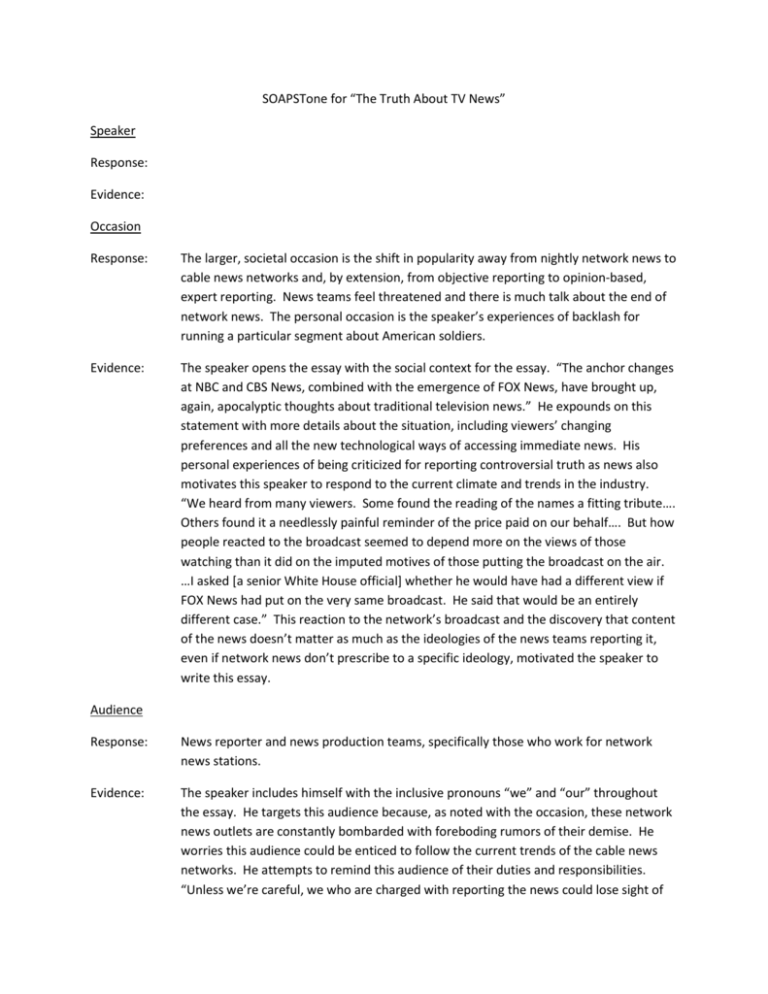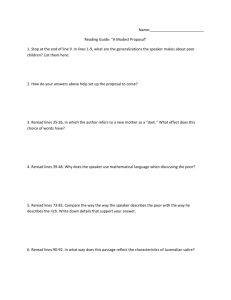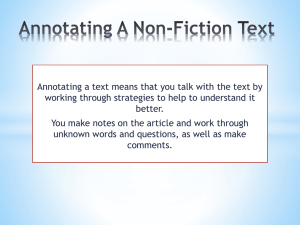The Truth about News
advertisement

SOAPSTone for “The Truth About TV News” Speaker Response: Evidence: Occasion Response: The larger, societal occasion is the shift in popularity away from nightly network news to cable news networks and, by extension, from objective reporting to opinion-based, expert reporting. News teams feel threatened and there is much talk about the end of network news. The personal occasion is the speaker’s experiences of backlash for running a particular segment about American soldiers. Evidence: The speaker opens the essay with the social context for the essay. “The anchor changes at NBC and CBS News, combined with the emergence of FOX News, have brought up, again, apocalyptic thoughts about traditional television news.” He expounds on this statement with more details about the situation, including viewers’ changing preferences and all the new technological ways of accessing immediate news. His personal experiences of being criticized for reporting controversial truth as news also motivates this speaker to respond to the current climate and trends in the industry. “We heard from many viewers. Some found the reading of the names a fitting tribute…. Others found it a needlessly painful reminder of the price paid on our behalf…. But how people reacted to the broadcast seemed to depend more on the views of those watching than it did on the imputed motives of those putting the broadcast on the air. …I asked [a senior White House official] whether he would have had a different view if FOX News had put on the very same broadcast. He said that would be an entirely different case.” This reaction to the network’s broadcast and the discovery that content of the news doesn’t matter as much as the ideologies of the news teams reporting it, even if network news don’t prescribe to a specific ideology, motivated the speaker to write this essay. Audience Response: News reporter and news production teams, specifically those who work for network news stations. Evidence: The speaker includes himself with the inclusive pronouns “we” and “our” throughout the essay. He targets this audience because, as noted with the occasion, these network news outlets are constantly bombarded with foreboding rumors of their demise. He worries this audience could be enticed to follow the current trends of the cable news networks. He attempts to remind this audience of their duties and responsibilities. “Unless we’re careful, we who are charged with reporting the news could lose sight of truth as our ultimate goal. …How could it be that we would give up our belief in the truth? …Increasingly, some reporters don’t even ask whether something is true or false. They jump over this basic question and go straight to an analysis of who’s doing the talking and why.” Another clear appeal to and identification of the intended audience comes right before his own personal examples of backlash. “…those of us in network news don’t have the luxury of giving up on our goal of truth-telling.” Purpose Response: The speaker’s purpose is to convince the intended audience that the future of network news and objective reporting is bright, and that their jobs are extremely crucial. Evidence: The speaker implies his purpose throughout the essay, but the real call to action is revealed in the final two paragraphs. “This [getting it right in news reporting] requires real journalism, and it will not be easy. It will require that some of us in the news business put ourselves in harm’s way, as my colleagues are doing in Iraq. It will require continued and increased investment in things such as investigative work, beat reporting, and documentaries—an investment that some of us make daily but that others have trouble with in a universe of increased competition and reduced audiences.” The speaker ultimately wants the audience to “redouble [their] commitment to finding the truth…and [report] it to the American people….” Subject Response: The speaker believes that reporting the truth to American audiences is crucial in the current news industry climate, and the future of network news is positive. Evidence: After introducing the current, dismal climate for the network news industry in the opening paragraph, the speaker offers his contrasting view of the situation. “It will surprise no one that, despite such doomsayers, I see a bright future ahead for network news…. …I believe the new world offers us exciting opportunities to reach our audiences, as we find ways to deliver news that is available to people when and where they want it. For me, the real danger we face lies not in how we provide news, but in what we are providing.” Here, the speaker introduces a primary part of his argument: reporters and news agencies are moving away from reporting the truth, objective news. “The rush to present opinion is beginning to drown out our reporting of facts. The clash of ideas is moving to center stage, while the search for truth is being pushed into the wings.” The speaker proceeds to explicate how opinion has moved to the center stage, why it’s popular for both audiences and news teams, and, perhaps most importantly, why it’s dangerous. The final paragraph contains the speaker’s call to action. Directly before that, however, is his final comment on the subject that bookends his positive outlook on the situation. “If our faith is well-placed, then our investment will pay off in the form of loyal attention from people who come to us, day in and day out, simply because we present the truth, not mere opinion.” Tone Response: The speaker creates a concerned but hopeful tone in this essay. Evidence: Throughout the essay, the speaker acknowledges the critical time for network news teams, but he always careful to either contradict the negative outlooks or frame them as conditional. He offers concrete examples of what threatens objective reports of the news, as well as concrete steps to disarm those threats and hold fast to authentic, respectable news reporting. “…despite such doomsayers, I see…a future that can be even brighter than our past.” Positive framing such as this gives an optimistic, hopeful outlook on the situation. “But I have two concerns about where we are headed. First, …the more we fill us our reports with opinion, the less time we have for reporting facts. …There’s a second problem[:]…the expansion of opinion in television news…can create the impression among the audience that everything they’re seeing is an expression of someone’s opinion.” These problems create a tone of concern, but the speaker directly explains why they’re problems and what the audience can do to fix them; thus, he continues to maintain his hopeful tone. At the end of the essay, the speaker frames everything as conditional. “If our faith [that our audiences really want a responsible, reliable news report] is well-placed…. If we are willing to redouble our commitment to finding the truth….” These statements acknowledge there are real problems and threats, but framing them as conditional mitigates the concern with hope and potential for much better days ahead.






